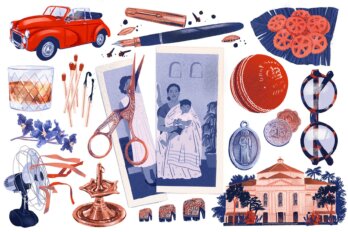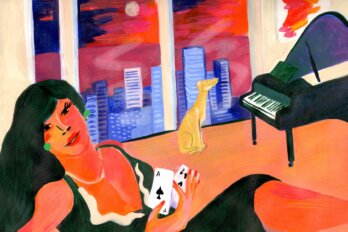When Doctor Gisele came this morning to assess me again, she asked me to name an animal that has four legs. I told her a snake. Honestly. Why does Residence Levigny have to treat us as if we are imbeciles, just because we are old? My youngest son, Armand, is the bright spot. We have a laugh if he visits without his wife. We laugh because, of my four sons, Armand is the only one not enrolled in an eternal quest for the business deal of the century.
The air in here—it is as if we are walking to the cafeteria and the bingo room in a warm vapour of piss. Not that the place isn’t clean. They keep it pretty tidy and if anyone has an accident they are good about cleaning that up. This week I am coping by reading the autobiography of Gabrielle Roy, which is hardly cheerful, I know. I have been trying to get one of my older sons, André or Gilles, to show me how to operate the flat screen TV they bought me, but they have not had time. The thing takes up a quarter of my room, mute, its useless lights flashing at all hours. And now Madame Poirer is coming to live here, and for some reason she is behaving as if we have been lifelong friends. She has called me every morning this week, wanting to know this and that.
Are there buses to take us to Bowling LeClerc? Do staff members meddle with your personal letters? Is the food sufficient in enzymes?
Jillian Tamaki
We asked five celebrated writers to devise five guidelines for composing a short story or poem. They all traded lists—and played by the rules.
Five Rules
by Alexi Zentner
- You may not describe any characters physically (beyond using “he” or “she” or their given name).
- Include a peach, but don’t make it sexual.
- You must have dialogue, but you may not use the word “said” (or any variation of the word “said”).
- Evoke warmth without mentioning the sun.
- A dog must bark in the distance, causing a character to state that he or she finds people who treat dogs like children sort of creepy. Somebody else must take offense at this comment.
No, Madame Poirer, never a close friend, there are no buses because how can the staff take 275 of us out? There will be no bowling here, and no soft serve at Le Glacier Dillon on Rue Rivard. Last week two twenty-dollar bills disappeared from my room, and no, the food has no enzymes. Come on, Armand. It’s noon. That’s the thing about Armand, you can’t rely on him to be on time. But what I love is that he reminds me of things I have forgotten. Do you remember this, Maman? Do you remember that? What a laugh we had last week.
“Do you remember Madame Poirer’s dog? ”
We dipped celery and radishes in salt. Armand escapes his wife in Montreal and we snack. His wife is intelligent but not sensible. She does not understand that my youngest son will not thrive in the city. I tried to teach her, when she married him, how to look out for certain things, but she is one of those women who believe if men are stupid enough not to check their pockets for fifty-dollar bills before they go to the laundromat, then that is the men’s own problem. This is something I find hard to understand, but I don’t hold it against her.
“I do remember that dog.” The celery was cold, the radishes bitter, and I have always loved salt. “Even before she got that dog, Madame Poirer was dog crazy. I remember we were at Le Glacier Dillon and some hound yelped across the terrace and its owner bought it a cone. When I gave my opinion on it you would think I had personally insulted Madame Poirer. People treating dogs like real children. There is something creepy about it. Oh, she disliked me that day!”
Madame Poirer and her husband began poor. We all did. But her husband started driving a school bus. Soon he had a whole fleet of buses, and he made a fair amount of money with that, then he opened a shop. He was not the smartest of men. He was naive. But he managed his little business all right. He and Marcelle, that is Madame Poirer’s given name, began to think more highly of themselves. Madame Poirer became a snob, then she acquired that little dog.
“Armand, what was that dog’s name? ”
We had a dog ourselves, a dog my husband had named Alphonse Daudet, after the French writer.
“Nanette? ”
“No. I think it was Dentelle.”
“That’s it. A frilly dog.”
Armand can bring the past to me in a way my other sons do not. When Armand was born, he weighed three pounds. You would not guess this now. In those days, a three-pound baby did not always survive.
People come and go at a great rate here. Last week Monsieur Paquin died. Again, Armand had me snorting, though I felt sad about Monsieur Paquin, with whom I have danced. Armand reminded me Monsieur Paquin once had a fruit stall. He sold peaches and pears.
“Remember,” Armand found us some egg sandwiches at the funeral reception, “what Monsieur Paquin told me about packing peaches? ”
When Armand was twelve, he sold Monsieur Paquin’s peaches door to door, in a cart. In the mornings he took the peaches from crates and put them in bags.
“No one will notice if you put one rotting peach in the bag, but if you put two in, they will say something.”
“That’s right. He put one bad peach into every single bag he ever sold.”
When Armand told his wife that story, she thought less of Monsieur Paquin when she saw him coming and going in these halls, on her infrequent visits. Over peaches he sold almost half a century ago. Do you see what I mean about my son’s wife? There are a lot worse things a man can do than put one rotten peach in every bag. She is something of a dreamer, that one. She imagines my son can live with her for the rest of his life in the city. She does not realize Monsieur Paquin’s habit of cheating his customers with the peaches is funny.
Armand opened a tin of cashews. “Madame Poirer’s dog was named Dentelle, and it was forbidden to leave home.” We both knew our dog, Alphonse Daudet, had the run of the entire town of Abercorn. There was no place in town off limits to Alphonse Daudet. “And—do you remember, Maman, that Madame Poirer put a chastity belt on her dog? ”
A chastity belt! Who knew there was such a thing for dogs? These were the heights to which Madame Poirer, in her new-found social stature, with her husband’s school bus fleet, had risen.
The cashews are something I like to keep on hand. When my older sons visit, it is all business. It is about my bills being paid, and my signature on statements giving power of attorney to the eldest in the event my reason fails me, and arrangements to do with extra services. They think I need someone paid to look in on me. I dislike it when the paid visitor barges in. My older sons do not take me to Walmart, or buy small stepladders so I can climb into their passenger seats, or drive me over the Vermont border to see the splendour of the leaves. Armand and I go to Tim Hortons, where I have chicken noodle soup, then we go to Walmart and I stock up on my cashews, and on M&Ms for my grandchildren. Armand never washes his van. I have given him money in an envelope and told him to go to a car wash and spend that money on washing his van.
“But Madame Poirer discovered Alphonse Daudet in her attic, do you remember, Maman? And he had torn the chastity belt off Dentelle.”
“And Alphonse Daudet made Dentelle pregnant.”
Armand can never find a parking space close to Walmart’s door, so he lets me off and I wait. I lean on my stick. There are times I have to wait ten minutes, the parking lots are so full. While I am waiting I look at young people go by, and I remember lost romance, which is a thing I regret about this whole business of growing old.
There was a bakery in Vermont where we all used to get peanut butter pie. The bakery had a worker who looked at me and flashed an instant of electricity. Every time, until one day—
I don’t know what happened—maybe I skipped a summer or something died in him, or in me, but one day he was no longer generous with his electricity. He was no younger than I was, but he did not want to waste an electron on me any longer. I saw him flirt with a younger woman. Much younger than himself, but is life fair?
Armand brings me something that is not the old days or their romance, but what he brings me is… there is an ointment my husband used to put on the udders of our cows. It came in a yellow tin. Romance departed and its spot gaped raw—I wouldn’t tell this to just anyone—and nothing came to heal it. That is old age for you. But the laughter Armand and I enjoy is salve on that spot. Is this strange? Of course I do not mean I am in romantic love with my son.
“And Madame Poirer made Dentelle have an abortion.”
“I never knew that, Maman.”
“And then Alphonse Daudet got in her attic with Dentelle again. He took the chastity belt off her again, and got her pregnant a second time.”
I have informed the dining room staff that I do not eat liver. On days when liver is on the menu they serve me chicken. I pay ten dollars extra on days Armand comes to the dining room with me. On those days I do not eat with my friends Madame Lefevre and Madame Pitre. They understand I am dining with my youngest son. This is something the older sons will not do. André is busy at IBM and Gilles cannot stand the food. But according to Armand’s wife, what the brothers really cannot stand is that everyone here is decrepit. She has no idea Armand tells me this. She is a woman who tries to legislate who tells what to whom. That is what I mean by telling you she is a dreamer. Armand smuggles her cat in here. There is a strict policy against animals, but he stuffs the cat into a hockey bag, brings it up the elevator, and lays it in my lap.
“Madame Poirer took Dentelle to get another abortion. But this time, her dog died. She was glad to be done with that dog once and for all. Now she is coming here and thinks we are going to be like old friends.”
Armand understands I worry about Madame Poirer’s professed intimacy. I have been here seven years, and not once in all that time have Madame Poirer and I spoken. In the fourteen years before that, when I was in my apartment on Avenue Ruisseau, Madame Poirer made no contact. But now that she is coming to live in this building… will she expect to sit with me at the table I share with Madame Lefevre and Madame Pitre?
I do not want to bother Armand with this problem. He has problems of his own, what with that wife. He keeps his socks in their basement because she feels he has too many pairs. To please her, he has gathered them in garbage bags and taken them downstairs. Each morning he has to go in the basement to get his socks. The wife has told me this. She believes she is telling it to me fondly; that we will laugh about it together; two women who love my son. My son’s wife has no idea how to laugh with me. She is the kind of woman who would not be able to enjoy the story of Madame Poirer’s dog without requesting details no one cares to remember: what exactly does it look like, a chastity belt for dogs, and of what material is such a thing made? She is the kind of woman who would go out of her way to stop at a veterinarian’s clinic, and go in and inquire. I can hear her now, asking the receptionist to show her a diagram.
This appeared in the July/August 2011 issue.







